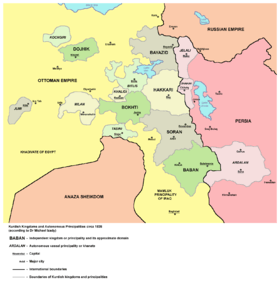Principality of Bitlis
Principality of Bitlis (1182–1847), was a Kurdish Muslim principality originated from the Rojaki (or Rozagi) tribal confederation. Claiming descent from the Marwanid dynasty,[1] the Rojaki defeated the Georgian King David the Curopalate and conquered Bitlis and Sasun in the 10th century.[2] The principality occasionally came under the rule of outsiders, such as the Ak Koyunlu (from 1467 to 1495) and the Safavids (from 1507 to 1514). After the decline of the Ak Koyunlu, the Rojaki princes asserted their independence. The principality supported the Ottoman Sultan Selim I and its rulers were named Noble Khans in return.[3] In 1531, the Rojaki prince withdrew his support for the Ottomans and turned towards the Safavids instead, an event that lead to the capture of the principality by the Ottomans.[4]
 |
|
|
Modern history
|

A good era for the principality began in 1578, as Sultan Murad III nominated Sharaf al-Din Bitlisi the Emir of the principality.[3] Until 1596, eighteen Rojaki princes ruled the principality.
The Rojaki rulers maintained their relative independence during the long rivalry between Ottomans and Safavids. In 1665, Abdal Khans status as the Emir of the principality was strengthened after a visit to Bitlis by the Ottoman sultan Murad VI as he supported the Ottomans in the feud between the ottomans and the Safavids.[5] Abdhal Khan has been described by the French traveller Jean-Baptiste Tavernier, as the most powerful Kurdish prince. According to him, Abdal Khan was independent and did not acknowledge the Safavid or Ottoman states.[6] Evliya Çelebi has praised Abdal Khan as a renaissance prince and owner of a library of books in several languages.[3] Several European travelers noted the ability of the emirate to call in militias in order to defend itself.[7] The autonomy of the principality ended in 1655 as Emir Abd al-Khan entered into conflict with the Malik Ahmad Pasha, the Wali of Van at the time. And al Khan was accused of confiscating properties in Bitlis by merchants in Van and an his closeness with the Yazidi. As result, the Ottoman Empire terminated its tolerance towards the autonomy of the principality of Bitlis.[8]
Footnotes
- Sharaf Khān Bidlīsī, Mehrdad R. Izady, The Sharafnam̂a, or, The history of the Kurdish nation, 1597 (2005), p. XIX
- E.J. Brill's first encyclopaedia of Islam, 1913-1936, p.1144 , ISBN 90-04-08265-4.
- Eppel, Michael (2018-08-08). The Kurdish emirates. Routledge Handbooks Online. doi:10.4324/9781315627427-4. ISBN 978-1-138-64664-3.
- Eppel, Michael (5 June 2016). A People Without a State, The Kurds from the Rise of Islam to the Dawn of Nationalism. p. 31. ISBN 978-1-4773-0911-7.
- Eppel (2016), p.32
- Eppel (2016), p.33
- Eppel (2016), pp. 32–33
- Eppel (2016), p. 33